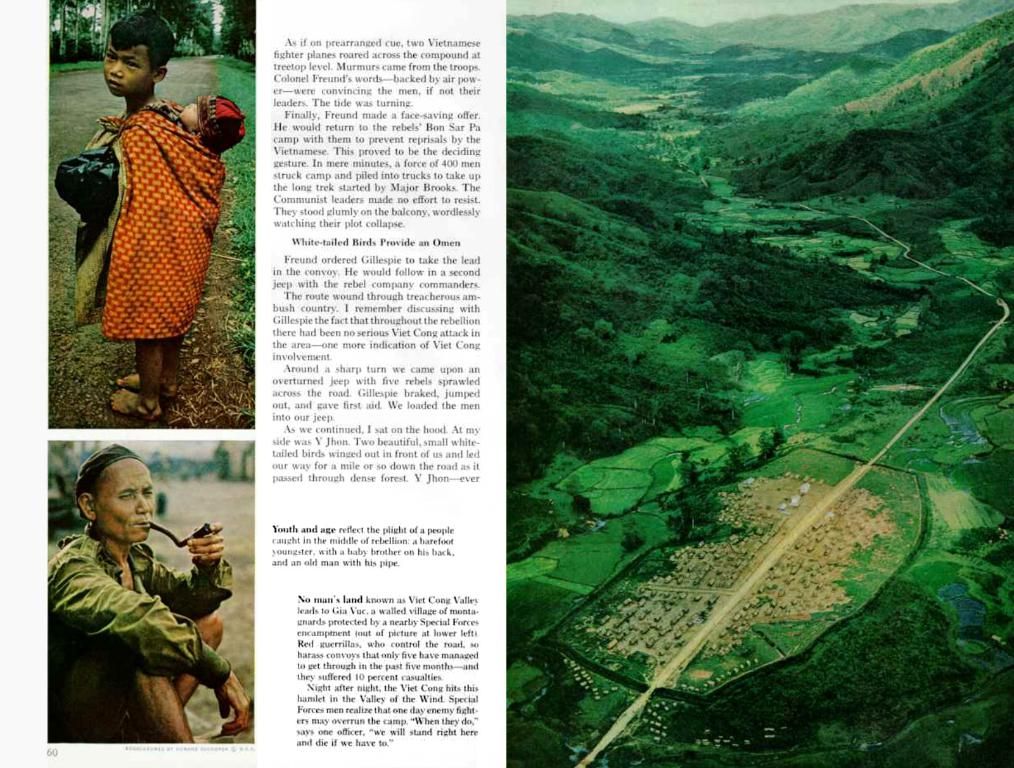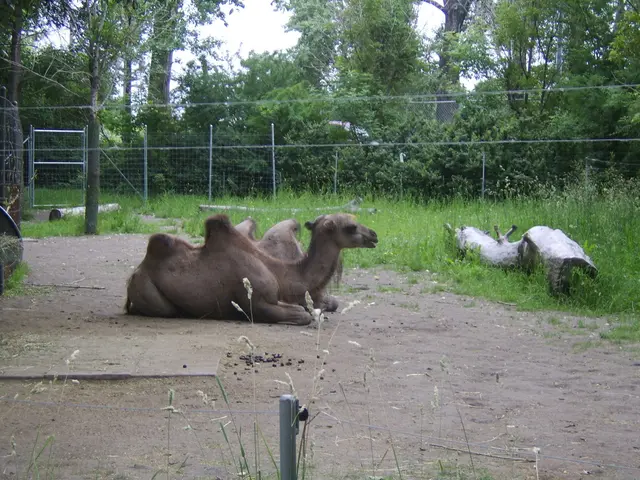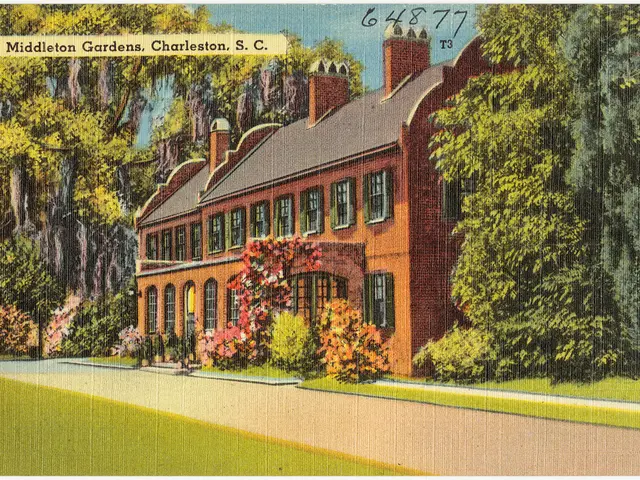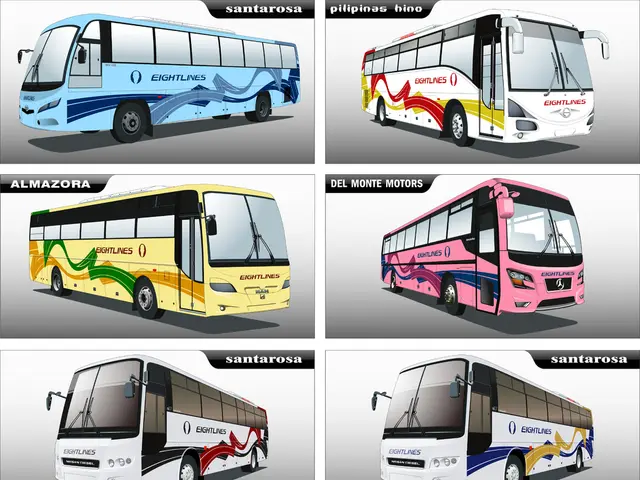Historical Revisit: "Kill the Boer" Echoes Once More: A Cry for Unresolved Colonial Trauma and Economic Inequality
In the heart of Kwakwatsi, Free State, on a sweltering May day, Julius Malema, South Africa's fiery leader of the Economic Freedom Fighters (EFF), concluded his rally as he typically does - by belting out his beloved anti-apartheid anthem, "Dubul' ibhunu." Translated to English as "Kill the Boer" or "Kill the farmer," this song has been a contentious and sensitive topic in South Africa and beyond. Yet, despite the controversy, Malema has been vocalizing this song since 2010, and it's not without reason.
Four days prior, on May 21, during a tense standoff at the White House with President Cyril Ramaphosa, Now-ex President Donald Trump played a video of Malema and his supporters chanting "Dubul' ibhunu." Trump asserted that this was evidence of a "white genocide" in South Africa, demanding Ramaphosa explain Malema's conduct. However, it is crucial to note that no white genocide is occurring in South Africa. In fact, the country's Equality Court ruled in August 2022 that the song does not constitute hate speech. By repeating it in Kwakwatsi, Malema was undoubtedly capitalizing on the media attention that Trump's misleading allegations sparked globally.
Trump's actions and subsequent claims overshadow a substantial reality - millions of Black South Africans, like many across the continent, are demanding meaningful socioeconomic change and long-overdue justice for the enduring legacies of colonialism and apartheid. They are calling for a modern revolution.
The limelight given to Malema by Trump and his confidant, Elon Musk, distracts from this pressing reality. Their focus on Malema tends to overshadow the profound desire for economic empowerment and justice that permeates South African society.
The EFF's platform centers on economic transformation, such as land expropriation without compensation and nationalization of mines, while embracing Black nationalism and pan-Africanism. The party also supports Russia in its standoff with NATO and positions itself against perceived Western dominance - ideals that are not entirely new, as can be traced back to the Pan Africanist Congress of Azania (PAC), a radical anti-apartheid movement founded in 1959.
Decades before the EFF's inception on July 26, 2013, the PAC, led by Robert Sobukwe, championed similar ideals. At the party's launch, Sobukwe stated, "The Africanists take the view that there is only one race to which we all belong, and that is the human race." The PAC advocated for the return of land to Indigenous Africans, asserting that it was unjustly seized by white settlers. This sentiment - that land dispossession lies at the heart of South Africa's historical injustice - has only recently begun to be addressed by the African National Congress (ANC) through the Expropriation Act 13 of 2024, signed into law by Ramaphosa on February 23.
South African history echoes with visions for African renewal. Sobukwe's philosophy laid the groundwork for what is often mischaracterized today as "radical economic transformation." Steve Biko's Black Consciousness Movement in the 1970s instilled pride and self-determination. In the late 1990s, President Thabo Mbeki championed the African Renaissance - a cultural, scientific, and economic revival aimed at decolonizing African minds and institutions.
Malema is not a revolutionary pioneer; rather, he is a powerful political vessel for the ideas long espoused by figures like Sobukwe, Biko, and Mbeki.
Like elsewhere on the continent, South Africans are revisiting the question of land. This represents a broader resurgence of postcolonial ideology.
Muammar Gaddafi provided a striking example in 1969 when he nationalized Libya's Western-owned oil companies to uplift the impoverished. Over a decade, Gaddafi provided free education, healthcare, and subsidized housing, giving Libyans Africa's highest per capita income.
Zimbabwe launched its land reform program in 2000 to reclaim land taken during colonial rule, following similar examples across Western and Southern Africa, such as Burkina Faso, Mali, and Niger. Across the continent, the legacy of colonialism still demands redress. South Africa remains the world's most unequal country, with a consistently high Gini coefficient. Decades after apartheid's fall, systemic racial inequality persists, sustained by disparities in education, employment, and economic access.
Trump's confounding decision on February 7, 2022, to sanction South Africa - partly over the Expropriation Act - reveals the West's historical amnesia and indifference. Many Black South Africans yearn to move beyond the past, but are continually deterred by a refusal to correct entrenched inequality.
Ironically, Trump's intervention may serve to galvanize African governments. His public posturing may resonate with his domestic base, but his tone-deafness will only deepen anti-US sentiment among South Africans. Anti-Western sentiment is already on the rise across the continent, fueled by historical grievances, neocolonial policies, and the emergence of new global powers like Russia and China. This disillusionment is manifested in the rejection of Western-backed institutions and a growing appetite for alternative partnerships.
Instead of attempting to shame Ramaphosa on the world stage, Trump would do better to support equitable and lawful reforms. Focusing on Malema is fruitless - he is merely the voice of a generation grappling with economic pain and historical betrayal. The revolution in Africa is far from over.
- The ongoing war-and-conflicts across Africa are causing a mass migration of people, creating a significant number of refugees.
- The health of these refugees is at risk due to lack of access to basic necessities and medical care, a concern that is often overlooked in the breaking news.
- Governments are struggling to provide quality education to the growing population of refugees, exposing them to a future of limited opportunities.
- As the world focuses on social-media platforms, the stories of these refugees and their plight are often buried beneath memes and viral trends.
- Policies and legislation are needed to address the urgent needs of these refugees, including provisions for their safety, education, and economic empowerment.
- Car-accidents and fires in many African countries are on the rise, causing untold hardships for the populace due to inadequate emergency services and resources.
- In sports, football is the most popular game played in Africa, with the European leagues, NBA, Premier League, and NHL gaining considerable following.
- Sports betting is booming in many African countries, overtaking traditional forms of gambling due to the growing popularity of sports such as basketball, basketball (NCAAB), hockey, golf, and auto-racing.
- Books like "Dreams of Africa" and "The Wretched of the Earth" offer a riveting perspective on the continent's history and the struggle for freedom and equality.
- The migration of people from Africa to Europe has been a major issue in politics, with discussions on immigration and visa policies dominating debates.
- In the field of entertainment, pop-culture icons like Hakim and Aya Nakamura are adored across the continent, with their music and fashion influencing millions.
- Sci-fi and fantasy shows like "Black Panther" and "Alien: Covenant" are captivating viewers worldwide, while showing the potential of African talent in the entertainment industry.
- General-news covers a wide range of topics in Africa, from economic development to politics, crime, and culture, offering a glimpse into the continent's diverse landscapes and stories.
- Crime and justice reminds us of the prevalence of theft, violence, and corruption in many African countries, highlighting the urgent need for reform and regeneration.
- The weather in Africa varies greatly, with regions experiencing harsh droughts, devastating floods, and sea-level rise, calling for weather-forecasting services to prepare communities and protect their livelihoods.
- Tennis stars like Roger Federer and Serena Williams have garnered tremendous admiration across the continent, inspiring millions to try the sport.
- Sports-analysis programs like SABC Sport Live provide valuable insights into sports in African countries, enriching the viewer's understanding of the game.
- Mixed-martial-arts tournaments like UFC Africa and EFC Worldwide are gaining popularity in Africa, showcasing the continent's rising martial-arts talent.
- As climate change continues to threaten the environment and impact weather patterns worldwide, it is crucial for Africa to invest in green technologies to mitigate its effects.
- The passion for sports extends beyond playing and watching the games; it influences various aspects of culture and commerce, such as sports merchandise, tourism, and fan culture.








